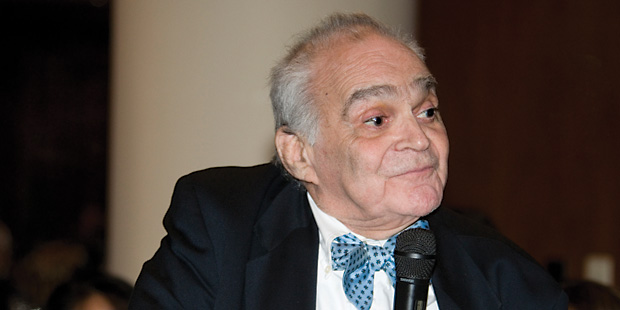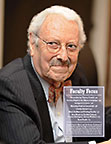A Tribute to Lowenfeld
Printer Friendly VersionChristopher Borgen ’95, a former student of Herbert and Rose Rubin Professor of International Law Emeritus Andreas Lowenfeld, shall always remember the Alamo.
In 1999, mentor and student were reunited at a judicial conference in San Antonio. They set off together to visit the former Spanish mission where Davy Crockett and his comrades were killed in 1836 during the most famous battle of the Texas War of Independence from Mexico. “Andy had us poring over historical documents, such as treaties and land deeds,” rather than the popular exhibits reenacting the battle, said Borgen. Now a professor at St. John’s University School of Law, Borgen said his visit to a tourist trap was enriched by the historical investigations and became a valuable lesson: A good educator sees what others do not.
Borgen is hardly alone in testifying to the benefits of knowing Lowenfeld, who attains emeritus status this fall after 42 years on the faculty. Lowenfeld was given a special tribute in April at a three-day symposium organized by his colleague Linda Silberman, Martin Lipton Professor of Law, that focused on key areas of his scholarly impact: public international law, trade and economic law, private international law, and international arbitration.
Lowenfeld’s academic service as a world-renowned scholar and a muchbeloved teacher followed a lively career that began in the 1960s as a lawyer at the U.S. Department of State under presidents John F. Kennedy and Lyndon Johnson. Lowenfeld provided strategic counsel to those presidents during the Cuban Missile Crisis; the Nuclear Test Ban Treaty; the so-called “Chicken War,” in which the U.S. and the European Common Market sparred over poultry tariffs; and the U.S. invasion of the Dominican Republic. As a prolific scholar—Lowenfeld’s “selected” writings, according to a program distributed at the tribute event, number 14 books and 43 law review articles—he has lectured practically everywhere, notably at the Hague Academy in 1979 with a series of talks he called the “Public Law Tabu,” in which he proposed criteria for a global community largely free of strict legal rules and based instead upon what he termed “reasonableness, not certainty.”
Professional accomplishment, however, “doesn’t begin to tell you about Andy the man—the people he’s influenced, the scholars he’s mentored, the people he has enriched,” said Silberman as she introduced Lowenfeld. Thomas Franck and Harold Koh, among many others, added their own praises.
Franck, Murry and Ida Becker Professor of Law Emeritus, who passed away in May, said Lowenfeld’s work has rendered “sense and order to the world of conceptual confusion that has always marked great convulsions in the ordering of civilizations: the sort of thing that follows the dying of the light, the dusk of rationality. He was able to bring that clarity of his thinking to a real trifecta: to the Law School, to the U.S. courts, and even to the world of private commercial transactions—a whole new field aborning.”
Koh, dean of Yale Law School, took time out from preparing for confirmation hearings in Washington, D.C., on his nomination to become legal adviser to the State Department, to stop by and say of his mentor, “He taught me how to be a teacher, and a champion of reasonableness. And finally, how to be a problem solver—how to speak across ideological lines in this very troubled world.”
Michael Mattler ’95, minority chief counsel to the U.S. Senate Committee on Foreign Relations, sent a letter to be read aloud: “What I remember and love most is Professor Lowenfeld’s infectious enthusiasm for his subject, and his students.… The international litigation seminar [Silberman and Lowenfeld] taught was among the best courses I took while in law school, and helped me on a professional course that has included work on litigation before U.S. courts under the Foreign Sovereign Immunities Act and before international tribunals including the International Court of Justice, the Iran-U.S. Claims Tribunal, and the United Nations Compensation Commission.” In a later interview, he added, “One can never fully repay what one gets from mentors such as Andy Lowenfeld. All we can do, those of us who were his students, is go out into the world and put the lessons we’ve learned to good use.”
–
All of 2009 Faculty Focus


 Multimedia
Multimedia